The Iliad is an epic that tells about only a few weeks during the Trojan War. The Iliad does not tell the entire story of the war, which is supposed to have lasted for ten years. But the audience is expected to be familiar with the entire story of the Trojan War, including all the events that occurred before and after the war. These pre- and post-war events are referred to in the Iliad, but they are not explained, so here are a few of the most important stories.
The Birth of Paris
The story begins in Troy with King Priam and his wife, Hecuba. Hecuba was pregnant and one night she had a dream in which the child she was carrying was a firebrand (a piece of burning wood used to start fires), and the firebrand set fire to the entire city. When Hecuba told her dream to her daughter, Cassandra, Cassandra prophesied that the child Hecuba was carrying was destined to destroy the city. Cassandra advised her parents to expose the child as soon as he was born. But Cassandra was fated never to be believed [see Apollo], and so her parents said they would not think of doing such a terrible thing. When Paris was born, he was a very handsome baby, and his parents treasured him greatly. (By the way, in the Iliad, Paris is also sometimes referred to as Alexandros or Alexander.)
The Wedding of Peleus and Thetis
Many years later, all the gods were excited about attending the wedding of Peleus and Thetis. Peleus was a mortal man who had distinguished himself as one of the Argonauts [see Argonauts]. Thetis was a gorgeous and desirable sea goddess, but she was fated to give birth to a son who would be stronger than his father. When Zeus and Poseidon, who were both very interested in her, learned of this prophesy, they were suddenly very eager to marry her off to a mortal man.
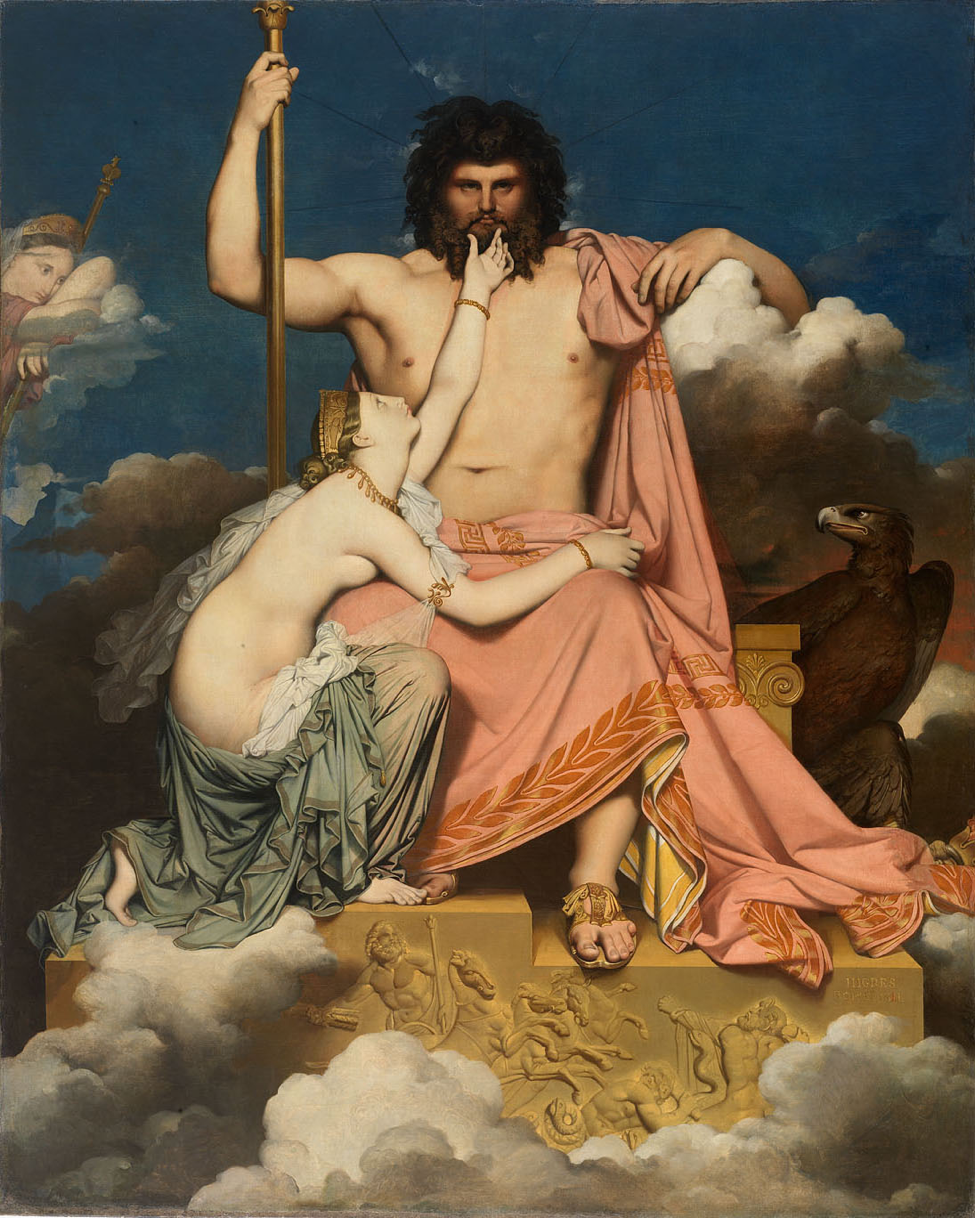
Jupiter and Thetis by Jean-Auguste-Dominique Ingres (1811) in the Musée Granet in Aix-en-Provence, France
The wedding was a splendid affair, attended by all the gods and goddess except one. Eris, the Goddess of Discord, was not invited because of her tendency to cause problems among the gods. Eris was, of course, offended by the slight and created a sure way to cause as much strife as possible. She took a golden apple and inscribed the words “for the fairest” upon it and threw it among the party guests. There were three goddesses, each of whom believed that the apple was meant for her: Athena, Hera, and Aphrodite.
The Judgment of Paris
The goddesses took their dispute to Zeus, who wisely refused to judge the matter, knowing it would only cause trouble for him. Zeus decided that the handsomest man on earth should decide the contest, and the handsomest man on earth turned out to be none other than Paris, who was now about twenty years of age. So all three goddesses went to Troy and asked Paris to decide which one of them was the most beautiful and should be awarded the golden apple. Each goddess secretly promised a gift to Paris if he should pick her. Athena offered to make sure he was always victorious in battle, Hera promised to make him ruler of the world, and Aphrodite promised to give him the most beautiful woman in the world. Paris naturally awarded the apple to Aphrodite. There was just one catch: the most beautiful woman in the world happened to be Helen of Sparta, and she was already married to Menelaus, the king of Sparta.
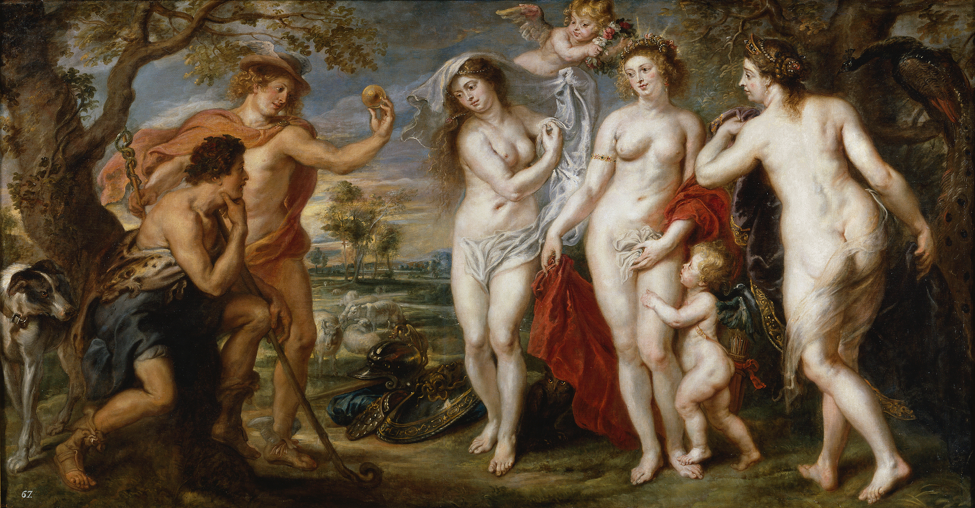
The Judgement of Paris by Peter Paul Rubens (1638-1639) in the Prado Museum in Madrid
The Abduction of Helen
Paris decided to take a trip to Sparta [map]. Paris was accepted into the house of Menelaus, the king of Sparta. Because of the laws of guest-friendship [see Xenia], Paris was invited to stay as long as he wished. Soon after Paris’ arrival, Menelaus had to journey to Crete [map] for his grandfather’s funeral. He left his wife and household, instructing them to make sure Paris was treated well. Aphrodite took the opportunity to send Eros to shoot Helen with his arrow and Helen fell in love with Paris. Paris absconded with Helen (and quite a bit of Menelaus’ treasure) and went home to Troy while Menelaus was still away.
When Menelaus found his wife and wealth gone, he was quite angry. In addition to his personal desire for vengeance, Menelaus knew that Paris had violated the laws of xenia, and that Zeus punished those who violated these laws. So Menelaus called upon his brother, Agamemnon, who was the king of Mycenae [see Argos on map] and the richest and most powerful of all the Greek kings. Together, Menelaus and Agamemnon called on all the other Greek kings to join an expedition to Troy to bring Helen back to Sparta.
But why would the other kings want to join such a dangerous expedition? Before Helen and Menelaus married, nearly every eligible bachelor in Greece wanted to marry her, since she was the most beautiful woman in the world. Tyndareüs, Helen’s earthly father, declared (at the advice of one of the suitors, Odysseus) that before he made his decision, all the suitors should swear an oath to come to the aid of the man he chose as Helen’s husband if he should ever have a problem with Helen being abducted by someone else. The suitors all agreed and swore an oath. And now Menelaus invoked this oath and asked for their help to fight against Troy. Besides, Troy was the wealthiest city in the world, so all the Greek warriors would be sure to bring back a great deal of loot (assuming they won the war).
Odysseus Joins the Expedition
Not all the Greeks were easily persuaded to join the fight. Odysseus, the King of Ithaca [map], preferred to stay home with his wife and infant son. When Menelaus came to Ithaca to remind Odysseus of his oath, Odysseus decided to pretend to be crazy. Menelaus found him plowing his fields and sowing the fields with salt instead of seed (sowing salt prevents anything from growing). Menelaus knew this was exactly the sort of trick Odysseus would pull, so to test how crazy Odysseus really was, he placed Odysseus’ son, Telemachus, in the path of Odysseus’ plow. (Telemachus was about a year-and-a-half old at this time.) When Odysseus pulled the plow away so he didn’t hurt the baby, he showed how sane he was. So Menelaus forced him to be true to his oath and join the expedition against Troy.
Achilles Joins the Expedition
Odysseus was instrumental in recruiting Achilles for the Trojan War. Achilles’ mother, Thetis, knew that if Achilles went to Troy he would not come back, so she did not want to let him go. Besides, Achilles was only about fifteen years old at this time. So Thetis dressed her son in girl’s clothing and she hid him on the island of Scyrus among the daughters of King Lycomedes. But Odysseus knew how to find out which one was Achilles. Odysseus dressed as a merchant and traveled to Scyrus, where he displayed his wares for all the girls to see. He set out some lovely jewelry and clothing, but he also set out some handsome weapons. All the girls flocked to the jewelry except one, who was examining the weapons. Odysseus knew that this “girl” was Achilles in disguise, and he easily persuaded the young hero to join the expedition to Troy. By the way, by the time Achilles left, one of Lycomedes’ daughters, Deïdameia, was pregnant with Achilles’ child. Deïdameia later gave birth to Neoptolemus. Because Achilles never did return from Troy, Neoptolemus was his only child.
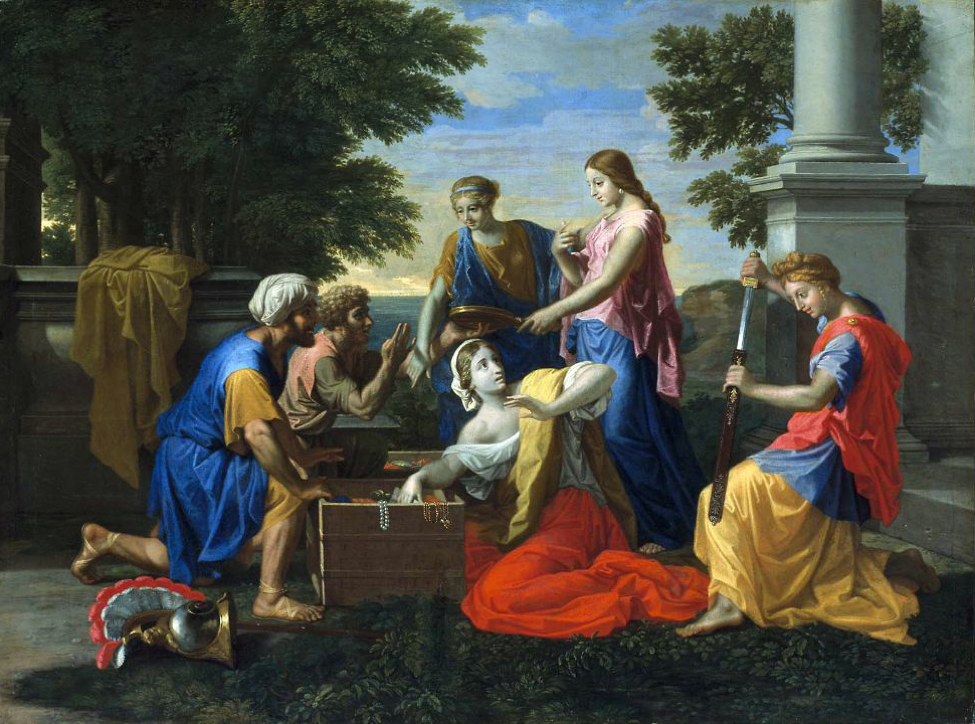
Discovery of Achilles on Skyros by Nicolas Poussin from around 1651 found in the Museum of Fine Arts in Boston
The Sacrifice of Iphigenia
The Greek warriors and their ships all gathered at Aulis for the long voyage to Troy. But just when they were about to leave, Artemis sent contrary winds, preventing them from leaving. The Greeks were forced to stay at Aulis for a month; their supplies were getting low and their tempers were getting short. In the end, Agamemnon was forced to sacrifice his daughter, Iphigenia, to Artemis, so that Artemis would stop the contrary winds and allow them to set sail for Troy. For the full story of how this happened, see Agamemnon and Iphigenia.
The Beginning of the Trojan War
When the Greek fleet finally reached Troy, they found that the fight was not quick or easy. The walls of Troy were very strong (they had been built by Poseidon and Apollo [see Poseidon], and the Trojans and their allies were great warriors. So the Greeks beached their ships and built a camp on the shore, and they settled in for a long war. The Trojan War went on for ten years; sometimes the Greeks came very close to taking the city, and sometimes the Trojans came very close to destroying the Greeks’ ships and their camp. The Greek troops also raided the nearby allies of the Trojans to gain plunder and supplies for themselves and also to prevent food from reaching Troy. The Iliad picks up in the ninth year of the war when everyone is extremely tired and cranky from the long, protracted struggle.
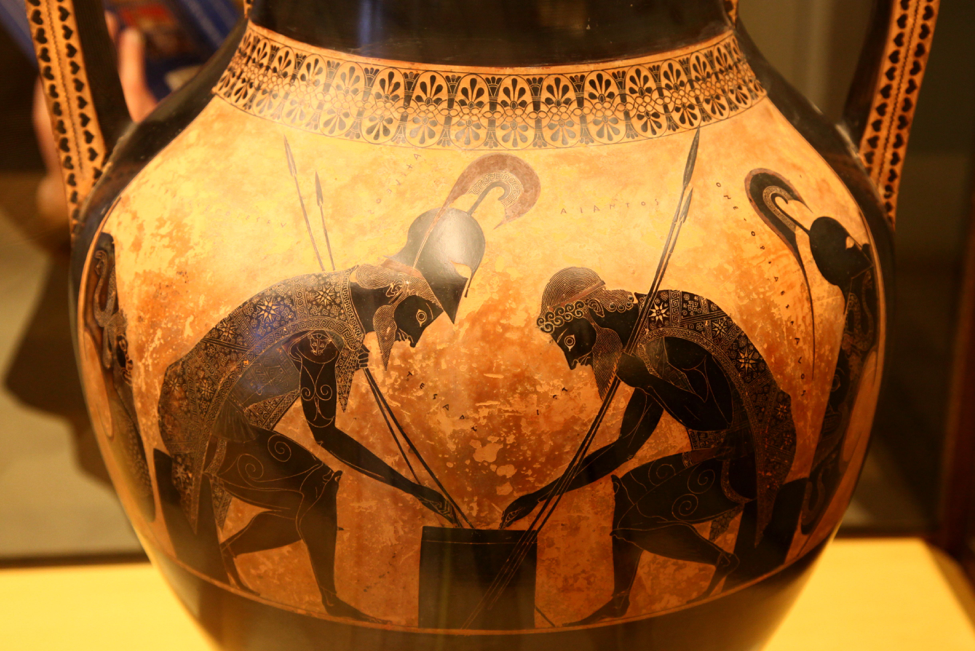
Ajax and Achilles playing draughts on an amphora in the Vatican Museum
Fighting at Troy
The Greeks fought at Troy for ten years without being able to conquer the great, walled city. Although the Iliad does not tell the story of the death of Achilles, we know that he dies before Troy falls. Paris kills him with an arrow. Note: The entire Iliad takes place during a few weeks of the 9th year.
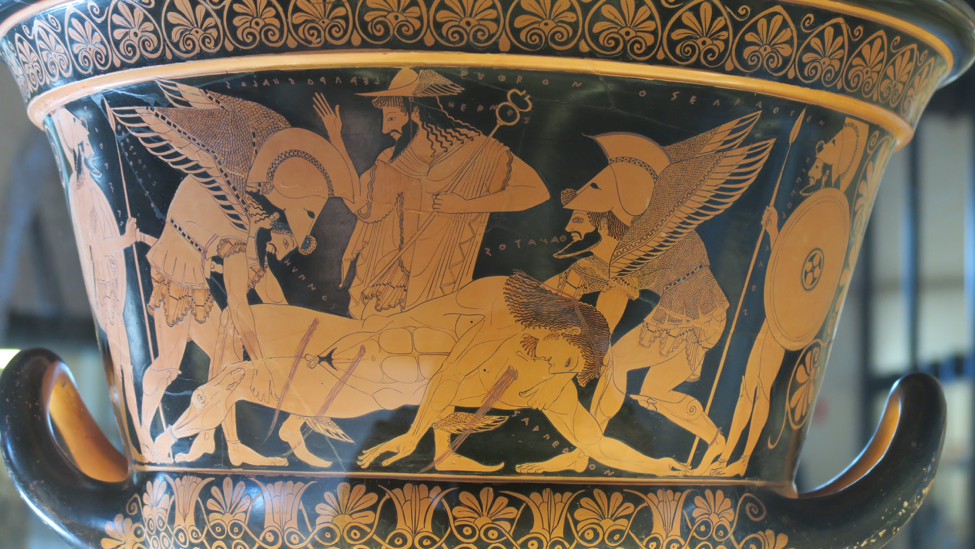
Hypnos (Sleep) and Thanatos (Death) carry away the body of Sarpedon on a krater housed in the Archaeological Museum of Cerveteri, Italy
After Achilles’ death, the Greeks were still unable to conquer Troy, even though they had fulfilled the four conditions that Helenus, the Trojan seer, had said were necessary before Troy could fall. (Those conditions were: Achilles’ son, Neoptolemus, had to fight on the Greek side; the bow and arrows of Heracles must be used against the Trojans; the remains of the famous hero, Pelops, must be brought from Greece to Troy; and the ancient statue of Athena, called the Palladium, must be stolen from the Trojan citadel). The cunning Odysseus finally thought of a plan that would allow them to get inside the walls and capture Troy.
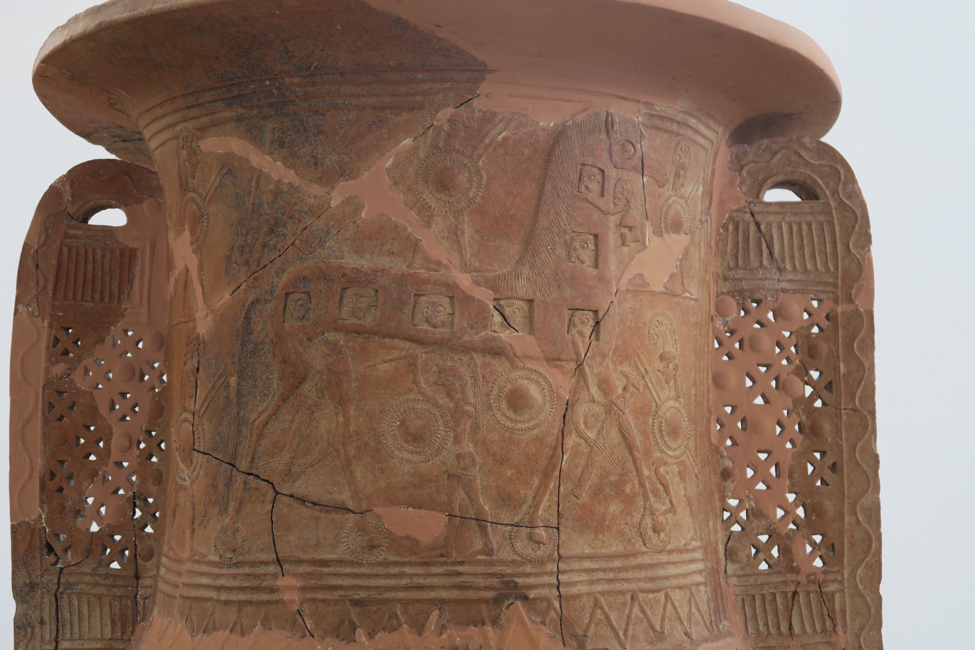
The Trojan Horse depicted on a pithos in the Archaeological Museum of Mykonos
The Trojan Horse
During the night, the Greeks built a huge, wooden horse, too big to fit inside the walls of Troy. They hid some of their best warriors inside, and sailed off to the neighboring island of Tenedos. When the Trojans awoke to find the Greek army gone and a huge wooden horse in its place (inscribed with the words: “For their return home the Greeks dedicate this thank offering to Athena.”), they joyfully brought the horse into their city, even breaking down part of their city walls in order to do it. That night, while the Trojans slept soundly after a day of feasting and celebrating, the Greek warriors crept out of the horse, opened the city gates to the rest of the Greek army which had sailed back from Tenedos, and the Greeks captured the city and burnt it to the ground. During the fall of Troy, Ajax the Lesser (the son of Oïleus, called “the Lesser” to distinguish him from the great warrior Ajax, the son of Telemon) rapes Cassandra in Athena’s temple. For the full story, see Athena.
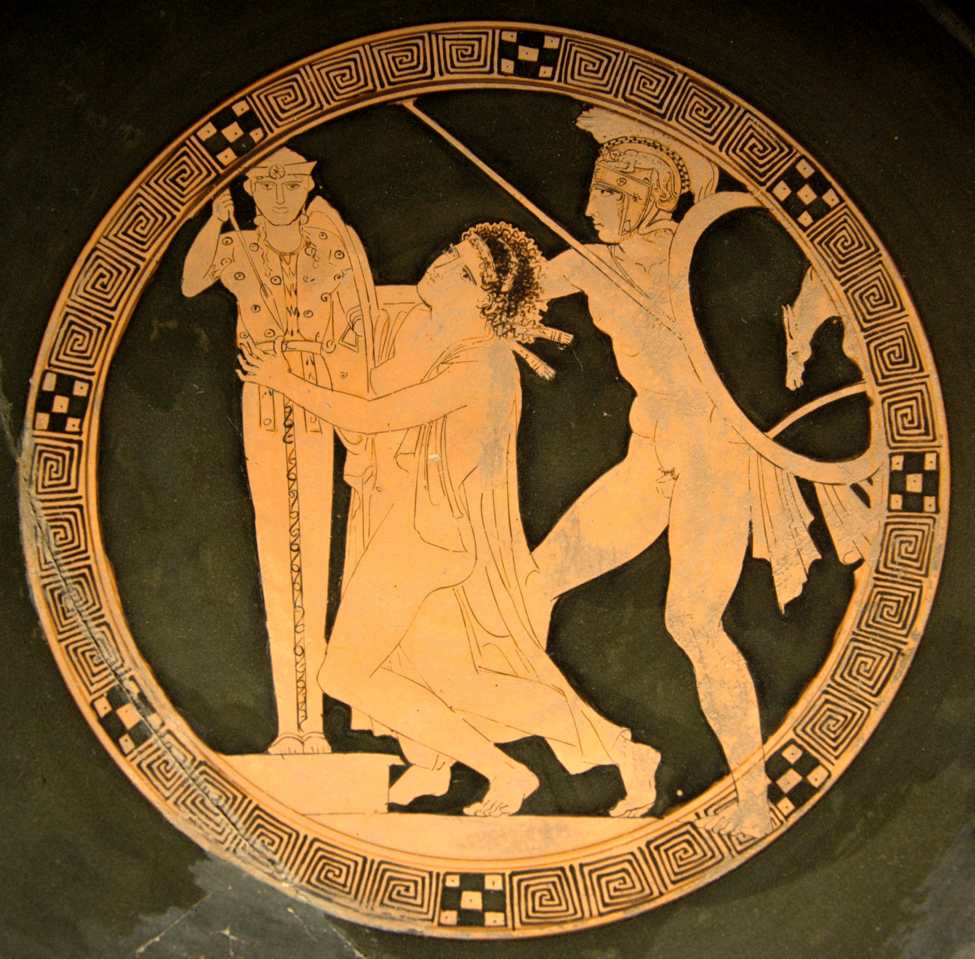
Ajax the Lesser raping Cassandra while she seeks refuge at the statue of Athena on a cup in the Louvre
Returns (Odyssey)
After fighting at Troy for ten years, many of the Greek princes had long and difficult voyages home. Menelaus wandered the seas for seven years before returning home to Sparta, and Odysseus took ten years to reach home, so that he was gone for twenty years in all. Agamemnon returned home quickly and safely, but as soon as he returned he was murdered by his wife, Clytemnestra, (with help from her lover, Aegisthus), who was angry over the sacrifice and murder of her daughter, Iphigenia. For more on the stories of the Greek warriors’ returns, see The Odyssey.








